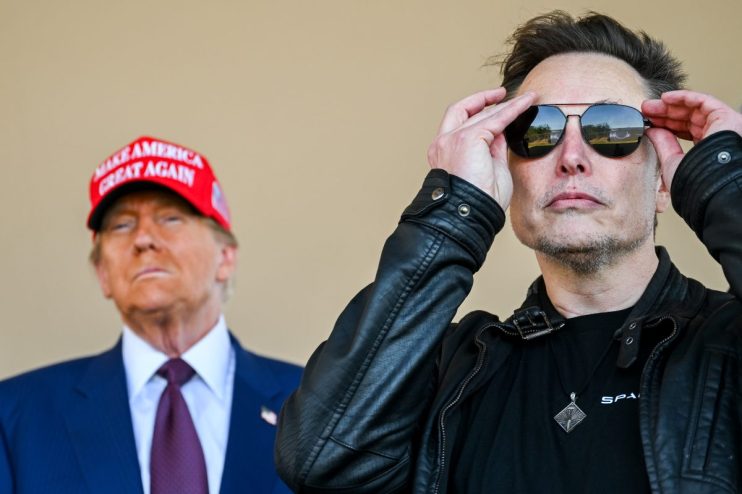Can Elon Musk really sway UK politics?

Elon Musk has been loud and proud about his intentions to influence UK politics. But will it actually work, asks Bill Sedat Frater
The start of the new year has seen billionaire CEO Elon Musk, possibly the most conspicuous donor to the Trump campaign, place the UK Prime Minister Sir Keir Starmer squarely in his crosshairs.
Over the past few weeks, Musk has gone from questioning the government’s handling of child grooming scandals to outright calling for the dissolution of Parliament. He has even floated the idea of replacing his previously close fan Nigel Farage as leader of Reform UK, due to Farage’s unwillingness to welcome far-right agitator Tommy Robinson into the party.
One can almost sense Farage’s disappointment – overlooked as a leader and seeing the prospect of a £80m donation vanish into thin air. A tough day at the office, indeed.
While these remarks have sparked sharp responses from across the political spectrum, they also highlight Musk’s growing influence as a global commentator on governance and policy. His provocations have sent ripples through the UK political establishment, reducing all other political happenings to mere footnotes as his commentary dominates UK media headlines.
Is Musk more powerful than Trump?
To be fair to him, Musk is hardly the first billionaire to exert influence over the political affairs of other nations. But Musk has bucked the trend of donors trying to remain discreet, instead embracing the megaphone provided by his own social media platform to whip up as much public furore as possible, purposefully demonstrating the extent of his influence.
The most obvious revelation is that provocative discourse remains the dominant force in shaping political narratives, and how easily serious issues, such as NHS reform, can be overshadowed by more sensational topics. This dynamic raises an intriguing question: is the agenda being driven by Musk or by Trump, who have both proven adept at harnessing media attention to amplify their priorities?
Musk’s influence on political debate has recently focused on issues he wants to highlight, often steering conversations away from conventional policy discussions to those that align with his interests. However, the deeper question is whether this influence translates into policy wins that reflect his ideological leanings.
For instance, during heated social media debates over the Christmas, Musk and his ally Vivek Ramaswamy publicly endorsed the need for skilled worker visas, a stance that attracted significant criticism from MAGA conservatives and influential right-wing commentators. Despite this backlash, Trump ultimately aligned with Musk, signalling the tech mogul’s substantial sway, even within a conservative movement that just won an election thanks, in part, to a fervent anti-immigration position.
This interplay not only illustrates Musk’s ability to wield significant influence over political discourse online but also hints at the broader implications for policymaking. Trump’s alignment on an issue his voters would not typically support demonstrates how Musk’s rhetoric can reshape debates and shift traditional party lines, reaffirming his role as a key figure in the evolving relationship between politics and media.
How is Musk shaping discourse in the UK?
Such an ability to influence political discourse also extends to the UK, where we have long observed the fragmentation of right-wing politics into various factions, movements and parties. Musk’s recent intervention in UK politics, for example, has brought into focus what may be the most significant example yet of why such fragmentation occurred in the first place.
As a result of Musk’s involvement, fringe figures like Tommy Robinson and populist parties such as Reform UK are now at the forefront of the national conversation. While the Conservative Party has been careful not to openly criticise, it has urged Musk not to support Reform UK in an attempt to prevent further amplification of their presence in mainstream discourse.
This situation highlights the delicate balance, or lack thereof, within right-wing politics, where populist figures and traditional conservatives are increasingly pulling in opposing directions.
Such social media battles also serve as an early test of UK-US diplomatic relations. For instance, the leader of the Liberal Democrats Sir Ed Davey expressed his unease, calling for the US ambassador to explain Musk’s remarks and urging the UK to prioritise rebuilding its relationship with Europe instead.
This example highlights yet another reason why the future relationship with an incoming Trump administration will be precarious. David Lammy’s previous comments labelling Trump a neo-Nazi, along with the rest of the Labour cabinet’s opposition to Elon Musk, highlight the tension as both Trump and Starmer are surrounded by individuals who clearly oppose the other nation’s leader.
As a result, the UK will likely face the dual challenge of asserting its sovereignty while simultaneously trying to court its most important ally.
All of this raises important questions for the future of the UK. Do these comments represent another push for Labour to strengthen its relationship with Europe, particularly on security? Or can this influence, while disruptive at times, also serve as a force for innovation and progress in both the US and UK.
Regardless of the outcome, as AI and tech-driven platforms continue to reshape political discourse, Musk will undoubtedly play an increasingly prominent role in shaping public opinion going forward.
The UK will, therefore, need to anticipate his ability to ignite global conversations, highlighting a key feature of modern politics: the power of individuals to shape narratives in ways that governments cannot.